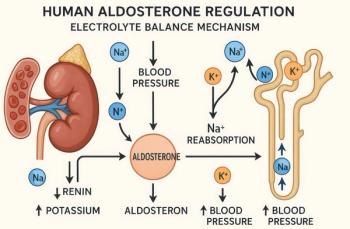
Hypertension During Pregnancy Linked to Later Heart Disease
UTRECHT, The Netherlands -- Even if hypertension during pregnancy subsides after delivery, a risky postmenopausal second act may await, researchers reported.
UTRECHT, The Netherlands, Feb. 2 -- Although hypertension during pregnancy usually subsides after delivery, a postmenopausal second act may await, found researchers here.
The postmenopausal course of women with a history of hypertension during pregnancy may be marked by coronary calcification and an increased risk of coronary artery disease, said Michiel Bots, M.D., Ph.D., of the Julius Center for Health Sciences and Primary Care here, and colleagues.
They found women with mild elevations of blood pressure from preeclampsia had a 57% increased risk of coronary calcification several decades later compared with women who were normotensive during pregnancy, they reported in the February issue of Hypertension.
"To the best of our knowledge, the present study is the first to show that a history of high blood pressure during pregnancy is related to coronary calcification later in life," they said.
Many women who have had preeclampsia exhibit the phenotype of the metabolic syndrome and impaired endothelial function three to 12 months postpartum, the researchers said. In addition, preeclampsia is associated with an increased risk of cardiovascular events and death later in life.
The findings of this study are in line with these observations, they said, and expand the evidence to an increased risk of atherosclerosis, a significant predictor of subsequent cardiovascular disease and total mortality.
The study population included 491 healthy postmenopausal women selected from participants enrolled in the PROSPECT study from 1993 to 1997. PROSPECT was one of two Dutch cohorts participating in the European Prospective Investigation into Cancer and Nutrition (EPIC).
Information on high blood pressure during pregnancy was obtained by questionnaire. Of the women, 151 (30.7%) reported having had high blood pressure in pregnancy.
The high prevalence of hypertension was most likely the result of a definition of "hypertension during pregnancy" that included not only brief and modest elevations during pregnancy but also women with preeclampsia, the researchers said. Unfortunately, they added, blood pressure levels for women with nonproteinuric hypertension or mild elevations were not available.
In 2004 and 2005, the researchers used multidetector CT to assess coronary calcium. The Agatston score, a volume measurement, and a mass measurement were used to quantify coronary calcium.
Women (now mean age 66.8 years) with a history of high blood pressure during pregnancy had a 57% increased risk of having coronary calcification compared with women without hypertension during pregnancy (OR 1.57, 95% CI, 1.04 to 2.37). Adjusting for age did not change the relationship (OR 1.64, CI 1.07 to 2.53).
High blood pressure during pregnancy was also a marker for increased body mass index (OR=1.05, 95% CI 1.01 to 1.09) and increased diastolic blood pressure (OR=1.03, CI 1.01 to 1.05). These factors may be regarded as intermediate parameters in the causal pathway from hypertension during pregnancy to atherosclerosis development, the researchers said.
The study's strength, the researchers said, was its population-based design and the high standards used for measuring coronary artery calcification.
Discussing the study's limitations, the researchers noted that because the information on hypertension during pregnancy was obtained by questionnaire when the participants were at or above middle age, misclassification may have resulted.
Because milder variants of hypertension were included, one might question the effect on the findings, they said. Despite the impossibility of precisely classifying hypertension in pregnancy, a positive history of hypertension was related to coronary calcification later in life. "We therefore assume the true relationship may be stronger than the one observed," they said.
Finally, they said, the relatively small sample size put some restriction on the precision of the estimates, adding that future studies with a larger sample size are needed.
These findings may have important implications for the management of women who have had high blood pressure in pregnancy, the researchers said. Up to now, it has been assumed that high blood pressure subsides after pregnancy, and there has been no structured follow-up of the women who experienced it.
This lack of policy needs reconsideration, Dr. Bots wrote. Women who develop high blood pressure during pregnancy need to be referred to a program that includes management of cardiovascular risk factors and should be closely monitored for increases in blood pressure, cholesterol, and weight.
Novel strategies of follow-up and cardiovascular risk-factor reduction in women who have had hypertension in pregnancy must be developed and evaluated for their potential to reduce cardiovascular disease in the future, he concluded.
Newsletter
Enhance your clinical practice with the Patient Care newsletter, offering the latest evidence-based guidelines, diagnostic insights, and treatment strategies for primary care physicians.
































































































































